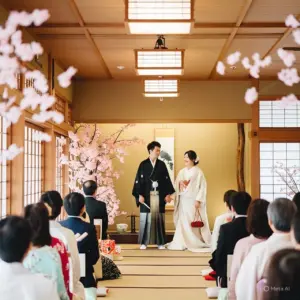It is said that Japan is the only country in the world where there is a system requiring the same surname for married couples. However, as an exception, optional separate surnames are applicable for marriages between Japanese and foreigners. (In this article, we use the term international married couples for marriage between Japanese and foreigners; not between foreigners.)
This time, I’d like to talk about separate surnames for international married couples in Japan. I also added the information about Japanese surname systems for children who are born from international married couples. I hope this article will be helpful for those who are considering marrying a Japanese person in Japan.
(目次=Table of contents)
- Why Can Only International Married Couples Have Separate Surnames in Japan?
- What is 戸籍(koseki)? It Is a Family Registry Used in Japan
- What Will Happen to 戸籍(koseki) for a Japanese Who Married a Foreigner?
- Q & A for Surnames of International Married Couples in Japan
- How About Surnames for Children Who Are Born From International Couples?
Why Can Only International Married Couples Have Separate Surnames in Japan?
From Japanese Civil Code (Part IV and Part V) Article 750 (English version).
Surname of Husband and Wife
A husband and wife take the surname of either the husband or the wife, as decided at the time of marriage.
According to Japanese Civil Code article 750, it is a requirement for Japanese married couples to have the same surnames (either the husband’s surname or the wife’s). This code came into effect in July 1898 (Meiji era) and it is assumed that it mentioned only Japanese married couples. Although the times have changed and there are more than 30,000 cases of international marriages every year, the Civil Code article 750 remains the same and doesn’t mention international married couples specifically.
It is said that the reason that separate surnames are allowed for international married couples is because foreigners are not applicable to Japanese Family register law even after they get married to Japanese. For those couples who want to use the same surnames or compound surnames in Japan, they need to complete separate procedures. (Please read this part for the details.)

What is 戸籍(koseki)? It Is a Family Registry Used in Japan
Family register law in Japan is the law which determines 戸籍制度(koseki-seido = family register system). This system registers people as a family group unit, and it publicly certifies the following information of Japanese citizens.
・a name of the head of household*
・registered domicile
・names of family members and relationships
・date of birth or death
・the information of marriage matters
(divorce or remarriage will be written only for a person of the head of household)
*If a new married Japanese couple choose the husband’s surname, the head of household is the husband. If they choose the wife’s surname, the wife is the head of household.
What Will Happen to 戸籍(koseki) for a Japanese Who Married a Foreigner?
As I mentioned, foreigners are not applicable to Japanese Family register law which means they don’t make a 戸籍(koseki) for foreigners who live in Japan. On the other hand, a Japanese who marries a foreigner has records on his/her 戸籍(koseki) about the fact of marriage with a foreigner and the information of him/her such as names, date of birth and nationality.
Q & A for Surnames of International Married Couples in Japan
Question
I’m a foreigner who got married to a Japanese. What should I do if I want to use the same surname with my Japanese spouse?
Answer No.1: In case a Japanese spouse changes his/her surname
If it has not been six months since you officially married* a Japanese in Japan, your Japanese spouse can change their surname at city hall. (*officially married means submitting a marriage certificate at the Japanese city hall where your residence is.)
However, after six months have passed, you need to go to Family Court and apply to change a surname first. After receiving their permission, you can submit the document which requests to change the surname at city hall.
Important! You need to keep in mind that only Japanese letters, ひらがな(hiragana)・カタカナ(katakana)・漢字(kanji), are allowed to be registered as surnames in Japan. Which means all alphabets need to be translated into katakana if your surname is alphabet notation. For example, if I want to use my husband’s surname, Hernandez, I need to write katakana either エルナンデス (erunandesu = closer to Spanish reading) or ヘルナンデズ (herunandezu = closer to English reading).
The complicated part is when your surname is in Chinese characters. Although Japanese 漢字(kanji) often is translated into Chinese characters, the letters we use in Japan are different from the one used in China or Taiwan. 簡体字(Simplified Chinese characters) is used in China, and 繁体字(Traditional Chinese characters) is used in Taiwan. There are also common characters among Simplified Chinese, Traditional Chinese, and kanji.
If your surnames are written in Simplified or Traditional Chinese characters, you need to change them to the closest Japanese kanji or katakana so that you can use your surname with your spouse in Japan.

Answer No.2: In case a foreign spouse changes his/her surname
There are three different ways from (A) to (C) for foreigners who want to use a Japanese surname in Japan.
Solution (A): Foreign spouse changes his/her surname in their home country.
The law of changing surnames is all different depending on where you are from, so you need to check websites of the responsible organizations in your country.
Solution (B): Foreign spouse uses a Japanese surname as legal alias (also known as common name).
Strictly speaking, this solution is not to change your surname in Japan, but it is the easiest way and you can use a Japanese surname for official procedures such as driver’s license*, employment insurance, national health insurance, and etc. You can also use your legal alias for private legal documents related to your work or any contracts.
To register your legal alias, you need to go to city hall and submit an application form for common name registration.
*Although a legal alias and real name can be written together on a driver’s license, your legal alias cannot be on your residence card.
Solution (C): Foreign spouse is naturalized as a Japanese citizen.
Well, this solution is not very realistic, but I wrote it down just in case. Naturalization means to change your nationality and become a Japanese citizen, so your marriage to your Japanese spouse will not be international but domestic (between Japanese). Since Japanese married couples must have the same surname by the Japanese law, you can use your Japanese spouse’s surname. (In this case, different surnames are not allowed.)
You need to remember there are many conditions for naturalization and the application process takes a considerable amount of time. And above all, you will lose your home country’s nationality since dual citizenship is not allowed in Japan.

Question
My Japanese spouse wants to combine my foreign surname with his/her Japanese surname. Is it possible to use a compound surname in Japan?
Answer: a Japanese spouse can use a compound surname in Japan after procedures.
Your Japanese spouse needs to go to Family Court and apply to change his/her surname. After receiving their permission, your spouse can submit the document which requests to change the surname at a city hall.
The order of the surnames is fine either way.
Pattern (A) a foreign surname + a Japanese surname
Pattern (B) a Japanese surname + a foreign surname
If a foreign spouse wants to use a compound surname in Japan, you need to change your surname in your home country or use the compound surname as your legal alias in Japan.
(For details, please refer to solution A and B in case that a foreign spouse wants to change their surname to a Japanese surname.)
How About Surnames for Children Who Are Born From International Couples?
Question
We are an international married couple in Japan, what will our child’s surname be?
Answer: It depends on a Japanese parent’s surname on 戸籍(koseki).
A child who was born from an international married couple in Japan has his/her 戸籍(koseki), so the surname of the Japanese parent written on 戸籍(koseki) will be his/her surname. The details are as follows.
In case you want your child to have a Japanese surname:
Either the case that parents have different surnames or the case that parents have the same Japanese surname, a Japanese surname will be registered on 戸籍(koseki) of the child.
So the surname of the child will be a Japanese one.
In case you want your child to have a foreign surname:
If a Japanese spouse has changed his/her surname to a foreign surname, the foreign surname will be registered 戸籍(koseki) of the child. The surname of the child will be a foreign one. There is no special procedure in this case.
If a Japanese spouse chose separate surnames from his/her foreign spouse, the child will have a Japanese surname without doing anything. In this case, a Japanese spouse needs to go to Family Court and apply to change the child’s surname. After receiving their permission, a Japanese spouse needs to go to city hall and submit the document which requests to change the child’s surname. After that, the city hall will make a new 戸籍(koseki) for the child. It may sound tedious, but you need to repeat the same process in case you have another child.
In case you want your child to have a compound surname:
There is no special procedure if a Japanese parent has a compound surname. A surname
on 戸籍(koseki) of the child will be registered as the same as his/her Japanese parent.
The information I wrote in this article is as of April 2025. If there are any changes for Japanese law, I will update the information. If you are interested in the same surname system in Japan and how it affects Japanese women’s life, please check the next article as well!


